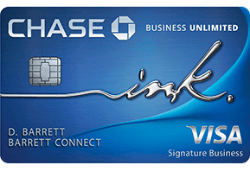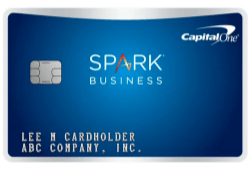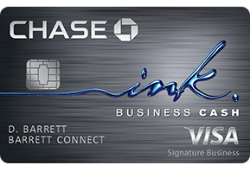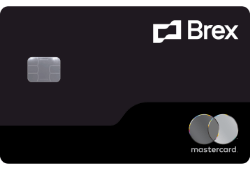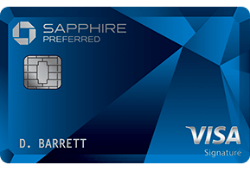Best Small Business Credit Cards
Whether your small business is a start-up or you've taken over your great-grandparents' family business, choosing the right credit card for funding business expenses is important.
If you work as a freelancer or gig worker, you may be eligible for a business credit card as well, so it's worth to evaluate and compare the offers on our site to help you make a sound spending strategy.
A small business credit card helps you separate your personal and business expenses. Monthly statements help you track spending more efficiently. Your card may even offer useful perks and valuable benefits not available with personal credit cards.
Best Small Business Credit Cards for July 2025


Chase Ink Business Unlimited® Credit Card
Fortunly's Rating: Our editorial team determines the rating based on a set of evaluation criteria developed for each product and service category.
Chase Ink Business Unlimited® Credit Card
- Earn $750 bonus cash back after spending at least $7,500 on purchases in the first three months since opening the account
- Add employee cards with spending limits at no additional cost
- Fraud protection, purchase protection, and personalized account alerts


Capital One Spark Miles for Business
Fortunly's Rating: Our editorial team determines the rating based on a set of evaluation criteria developed for each product and service category.
Capital One Spark Miles for Business
- Earn 50,000 miles after spending at least $4,500 on purchases in the first three months since opening the account
- Get unlimited 2x bonus miles on every purchase
- No blackouts, seat restrictions, or redemption minimums


Chase Ink Business Cash® Credit Card
Fortunly's Rating: Our editorial team determines the rating based on a set of evaluation criteria developed for each product and service category.
Chase Ink Business Cash® Credit Card
- Earn $750 bonus cash back after you spend at least $750 on purchases in the first three months account opening
- Get 5% cash back on the first $25,000 spent at office supply stores (online store included) and cable and phone services each account anniversary year
- Earn 2% cash back on the first $25,000 spent at restaurants gas stations and each account anniversary year
- Get unlimited 1% cash back on all other purchases


Brex Card for Startups
Fortunly's Rating: Our editorial team determines the rating based on a set of evaluation criteria developed for each product and service category.
Brex Card for Startups
- Get 30,000 bonus points after you spend at least $3,000 on purchases in the first three months account opening
- Offers a credit limit 10 to 20 times higher than traditional small business corporate cards
- Payment period extendable to 60 days
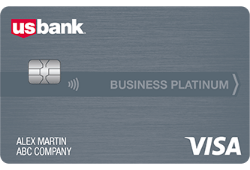

U.S. Bank Business Platinum Card
Fortunly's Rating: Our editorial team determines the rating based on a set of evaluation criteria developed for each product and service category.
U.S. Bank Business Platinum Card
- 0% introductory APR on purchases and balance transfers for the first 15 billing cycles
- Allows you to choose payment due date
- Free tool for expense tracking


Chase Sapphire Preferred® Credit Card
Fortunly's Rating: Our editorial team determines the rating based on a set of evaluation criteria developed for each product and service category.
Chase Sapphire Preferred® Credit Card
- Earn 60,000 bonus points after you spend $4,000 on purchases in your first three months as a cardmember
- Get 2x points on dining (including dining out, eligible delivery services, and takeout) and travel; earn unlimited 1x points on all other purchases
- Earn 2x total points on up to $1,000 in grocery store purchases each month
Top 5 Small Business Credit Cards - Our Picks for 2025:
- Chase Ink Business Unlimited® Credit Card
- Capital One Spark Miles for Business
- Chase Ink Business Cash® Credit Card
- Brex Card for Startups
- U.S. Bank Business Platinum Card
How We Evaluate Small Business Credit Cards
Interest Rate and APR
When choosing a small business credit card, one of the first things to pay attention to is the annual percentage rate. This is especially important if you expect to keep a balance on the card each month, rather than paying the entire bill on a monthly basis.
The APR is an annualized figure. The interest charges on your monthly bill are generally compounded daily, often with a grace period that allows you to pay 0% interest if you pay off all your charges within a specified period - generally about 25 days. The higher the APR, the more you'll pay for the products and services you purchase with the credit card.
Credit cards may offer a range of APRs for both purchases and balance transfers - all depending on the client's creditworthiness and current interest rates.
An introductory APR period is offered with many business credit cards, during which the interest rate is lower, or even 0%. The introductory interest rate and the length of the introductory period are additional factors according to which we evaluate credit card APR.
Credit Card Fees
The annual fee for using small business credit cards ranges from about $100 to $600. However, there are cards that do not charge an annual fee.
This doesn't necessarily mean that offers without the annual fee are more favorable, as they often involve fees for transactions abroad, cash advances, or balance transfers.
Many business credit cards also come with rewards, cash-back offers, and bonuses whose value can be much higher than the annual membership fee. We also take into consideration the fees for balance transfers, cash advances, and payments abroad.
Financing & Transaction Management Options
This is a good way to match particular cards with certain types of business. For example, some small enterprises have a seasonal character and an unusually variable inflow of cash, which is why a credit card may offer an installment plan or discounts if the debt is paid early. If you represent a new business, such credit cards are suitable for building your company's credit history.
Additionally, small business credit cards may include very useful expense tracking and management tools. For example, users may be able to import their transaction data into bookkeeping software or create a detailed annual report for taxation purposes.
To help users get the most out of their credit card accounts and business transactions, banks have come up with ways to encourage positive spending behavior. Issuing free business credit cards to full-time employees who are authorized to use the account on the company's behalf is a very common feature. In this case, account owners can set up restrictions such as spending limits for each card.
Rewards and Benefits
Most credit cards for small businesses offer attractive benefits such as points or cash back on purchases. Some have a simple reward structure that delivers the same cash-back percentage for every purchase. Others have higher bonuses for certain products and services (such as office equipment, business trips, telecommunication services), and smaller rewards for purchases in other categories.
Airline perks are also a big benefit for small business owners and many cards offer benefits to card holders with both international and national airline companies such as Delta Air Lines, United Airlines, Southwest Airlines and JetBlue.
Among small business credit cards, there are co-branded cards that may offer special hotel arrangements, access to a luxury experience at airport lounges, or car rental insurance.
Detailed Reviews of Small Business Credit Cards
Interest Rate (APR)
The Chase Ink Business Unlimited® card offers a 0% introductory APR on purchases for the first 12 months. After that, a variable APR of 13.24%-19.24% applies. This means you can finance business purchases for a year without any interest.
Credit Card Fees
The benefits of this credit card, such as a percentage of cash back for each purchase, are excellent, especially since there is no annual fee.
The penalty for late or returned payments is $39.
We've seen better offers in terms of balance transfer (either $5 or 5% of the amount) and cash advance fees (either $15 or 5% of the amount).
Financing & Transaction Management Options
Like other cards for small business owners, Chase's Ink Business Unlimited® lets you order cards for employees at no additional cost. Business owners can authorize their employees to use the card and to set individual spending limits for all authorized users.
Chase's mobile app lets you track receipts and set up notifications for employee cards.
Rewards and Benefits
If you spend at least $7,500 in the first three months after opening an account you earn a $750 sign-up bonus cash back.
Also, every purchase made for business purposes earns 1.5% cash back, and there are no restrictions on the number of purchases. This also applies to employees who use additional cards. Thus, the Ink Business Unlimited® is among the better credit cards for small business owners who prioritize cash back. However, it should be noted that all cash-back rewards are tracked as points. Each $1 in cash back is equal to 100 points, and to redeem a reward, you must collect at least 2,000 points.
Chase's Ink Business Unlimited® offers additional benefits like purchase & fraud protection, extended warranty protection on eligible US product warranties, roadside dispatch service and more.
Interest Rate (APR)
The annual percentage rate for purchases and balance transfers is 20.99%. This APR is variable and based on the prime rate, just like APR for cash advances (26.99%) and penalty APR (29.4%). Pay your bill within 25 days of the close of the billing cycle and you'll play no interest.
Credit Card Fees
Business owners who opt for Capital One Spark Miles pay no annual fee for the Spark Miles for Business card during the first year. After 12 months, the fee rises to $95 per year. Yes, it's a high fee. Maybe it helps to remind yourself that it's tax-deductible.
There are no fees for balance transfers, and if you use the card for cash advances, you will pay $10 or 3% of the advanced amount, whichever is greater. There's also a late-payment fee of $39.
Since the card is intended for frequent travellers, it's no surprise that there are no transaction fees for using it abroad.
Financing & Transaction Management Options
Like several other cards on our list, the Spark Miles for Business card lets you order additional cards for employees - at no charge. Employees' purchases make earning travel rewards easier.
Other useful features are quarterly and annual reports, a mobile application that allows purchase management and record-keeping, and purchase protection that kicks in if your card is subject to unauthorized use after being lost or stolen.
Rewards and Benefits
This card is very convenient for entrepreneurs who travel a lot. If you spend $4,500 in the first three months, you will receive a 50,000 mile sign-up reward. This can be redeemed for $500 that can be used for travel purposes.
Another Capital One Rewards feature, among the best on the market, is the ability to earn 2 miles per dollar for every purchase. Thanks to Capital One's Purchase Eraser, you can use miles from your account to cover the cost of travel purchases made in the last 90 days. Capital One lets you transfer miles to 15 airline partners, including Aeromexico, Alitalia, Emirates, and Finnair.
Spark Miles credit card users also receive a credit of up to $100 that can be used when applying for Global Entry or TSA PreCheck.
Interest Rate (APR)
This credit card is perfect for users who prioritize generous rewards. The APR for purchases in the first 12 months is 0%; a variable APR of 13.24%-19.24% applies thereafter. Late payments carry an APR of 29.99%.
Credit Card Fees
If you're looking to cut your expenses, a $0 annual fee is certainly a reason to consider Chase Ink Business Cash®. As for balance transfers, the fee is $5 or 5% of the amount of each transfer. Cash advances are a bit more expensive: Each ATM transaction is subject to a fee of $15 or 5%, whichever is greater. Planning to use your card abroad? Chase will charge you 3% of each foreign transaction. Late payments incur a penalty of $39.
Financing & Transaction Management Options
Additional employee cards come at no cost. This allows you to earn rewards faster. Chase lets you set up spending limits on a card-by-card basis. Another standard feature is a protection from unauthorized charges or personal information breaches; if this happens, the account holder won't be held responsible.
Besides the standard app provided by the bank, there's another app just for Ink credit card users. It lets cardholders track purchases, save receipts, create personalized purchase categories, and update spending limits for employees.
Rewards and Benefits
Cash-back bonuses are the most attractive benefit of using this credit card. If you make frequent purchases at office supply stores or use a credit card to pay for telecommunication services (phone, cable, internet), Chase Business is a perfect choice. You'll earn 5% cash back on every purchase up to the first $25,000. That's as much as $1,250 per year.
Purchases at restaurants and gas stations earn 2% on the first $25,000 - another potential $500 in your pocket.
Purchases in all other categories earn 1% cash back.
If your business doesn't require much spending for office supplies and other covered categories, opening a different credit card account that brings a higher cash-back rate for all purchase categories might be a good strategy.
The list of rewards doesn't end with cash back. Cardholders who spend $3,000 during the first 3 months receive 50,000 bonus points that can be redeemed for $500. Surely, Ink Business Cash falls into the category of credit cards with the highest rewards on the market.
Interest Rate (APR)
This small business card is unique in many ways. It is specifically designed for startups. That means there is no conventional interest rate - but the balance must be paid in full every 30 days.
Need a little extra time? Brex lets you extend the due-date for another 30 days. That's a great feature; startups operate in a dynamic environment and often need more flexibility.
Credit Card Fees
The annual fee for using Brex for Startups is $0, but if you plan to add employee cards, that will cost you $5 per month per card - an annual cost of $60 for each authorized user.
Since many credit card companies offer extra cards at no charge, you should consider other options if you're looking for this feature. There are no fees for using this card abroad.
Financing & Transaction Management Options
Brex dynamically and automatically sets credit limits based on your company's equity, the cash you have raised, and your spending patterns.
This is one reason this card doesn't require a personal guarantee. Credit limits rise as your cash flow increases.
Guided by the motto that "cash is air for startups," Brex credit card's creators have focused on cash flow to help entrepreneurs breathe easier. Spending limits can go up to 20 times the amount allowed by traditional business credit cards.
To get approved, your business must provide access to banking information. The card can help your business build its credit history, as reports on payments are sent to Dun & Bradstreet and Experian.
While you needn't provide a credit history when applying for your Brex card, you do need at least $100,000 to qualify.
Expense tracking is entirely automated. A Brex app scans your emails, photos, and even text, automatically matching them to your expense statement. This makes downloading expenses to your accounting software easier and faster.
In case of unauthorized transactions, the card is automatically blocked. Lost amounts are credited within 10 business days.
Rewards and Benefits
In addition to a sign-up bonus of 30,000 points, cardholders receive seven points per dollar on rideshare services, four points per dollar on flights and travel accommodations, three points per dollar on restaurants, two points per dollar on business software and one point per dollar on every other purchase.
Points don't expire, and there are no limits to collecting and redeeming them.
Points can be used to pay for air travel and accommodations through Brex's travel service. They can also be exchanged for points with many popular loyalty programs operated by airlines and hotel chains.
And last but not the least important thing: All cardholders get special discounts for popular online services such as Google Ads, Zendesk, WeWork, and Amazon. Points can be transferred to Brex's airline partners.
Interest Rate (APR)
This US Bank Business credit card comes with a 0% APR during the first 15 months for purchases and balance transfers that are made during the first 30 days. After the introductory period, a variable APR of 11.99% to 20.99%% applies based on creditworthiness at the moment of account opening and the prime rate.
Cash advances are subject to an APR of 25.99%. If you're late with payments or exceed the credit limit twice within 12 months, prepare for a penalty APR of 29.99%.
In this regard, we recommend the US Bank Visa Platinum card to those who seek lower interest rates for larger business purchases.
Credit Card Fees
Another great feature: There's no annual fee. You will pay a 3% fee on transactions when you are abroad.
Cash advances cost 5% or at least $10. There's also an excellent percentage for balance transfers - 3% or $5, whichever is greater. Late payment fees are progressive (ranging from $19 to $39) and depend on the balance amount. Additional cards for your employees are free.
Financing & Transaction Management Options
The expense management options of US Bank Platinum Visa are minimal but useful. The Overdraft Protection Plan protects all US business banking deposit account holders from "non-sufficient-funds" transactions.
Being able to choose a statement due date on your own gives you additional flexibility. All types of payments can be accepted, including transfers from credit card processing companies like PayPal or Apple Pay. Business-savvy customer service representatives are available 24/7.
Rewards and benefits
US Bank Business Platinum falls short on rewards, but it's one of the better cards for credit-building entrepreneurs who need simplicity. All the standard features are there.
If you prefer fancy perks, skip it. Otherwise, visit US Bank's website - especially if yours is a recently founded business looking for low fees and interest rates.
Interest Rate (APR)
This Chase credit card is probably not going to be interesting to those who prioritize introductory APR offers. A variable APR of 15.99% to 22.99% based on the user's creditworthiness and the prime rate applies from day one. The advantage is that there's no penalty APR for late payments.
Credit Card Fees
The annual fee of $95 is no bargain, and unfortunately there is no introductory offer for new account holders. If you frequently travel overseas, you can enjoy transactions without additional charges.
For balance transfers, the fee amounts to a minimum of $5 or 5%, and for cash advances, $10 or 5% for each transaction. If you make a late payment, the penalty can go up to $39.
Financing & Transaction Management Options
Business-specialist assistance is available 24/7 for Chase Sapphire Preferred® credit card customers. The downside is that this credit card doesn't include any credit monitoring tools.
Rewards and Benefits
Now we get to the most attractive features of this small business credit card. After spending $4,000 during the first three months, Chase Sapphire Preferred® cardholders get awarded a very generous bonus of 60,000 points.
This is equivalent to $750 that can be used on rental cars, accommodations, flights, and cruises purchased through Chase's Ultimate Rewards program.
When the points are redeemed for travel-related purchases through Chase Ultimate Rewards®, 25% more is added to the accumulated points.
If the points will be used for other redemptions, then they're worth up to $600. Therefore, it's best to use the sign up bonus of this credit card for traveling purposes.
Travel purchases outside the rewards program, as well as dining at restaurants across the globe, bring double points. All other purchases will earn you one point for each dollar you spend.
Another feature that is highly beneficial for frequent travelers is the ability to transfer points at a 1:1 ratio to airline and hotel partners' programs without any fees.
There are other built-in benefits that protect cardholders while shopping or traveling, such as purchase protection, extended warranties, trip cancellation insurance, and more.
The lucrative sign-up bonus and other features make the Chase Sapphire Preferred® one of the most alluring credit cards for small business owners who travel a lot.
However, you will need a good or excellent credit score to get approved.
What To Know Before Applying for a Small Business Credit Card
There are certain important factors that you should consider before applying for a small business card, namely:
Eligibility and Liability
Card issuers consider more factors during the approval process for a business card than they do with personal credit cards. If you're a sole proprietor or just starting a business, credit cards options are limited.
You may be able to get a card that doesn't require a business credit history. In that case, you will be personally responsible for the debts of your business.
Make sure TransUnion, Equifax, and Experian have updated information about your credit history, as this data will directly affect the terms you qualify for.
You'll also need to tell card issuers the industry your company operates in, how many employees you have, how long you have been in business, and what your annual income and expenses are. Don't forget about your licenses and insurance policies; make sure they are up to date because issuers check them as well.
If you represent an LLC or a partnership with an existing business credit history, then consider business credit card offers with a company or joint liability.
All in all, before issuing a credit card, you will have to sign a guarantee - a binding statement of responsibility for your credit card balance.
It is also necessary to provide a personal Social Security number. If you already have employees, the issuer will also ask you for your Employer Identification Number.
Credit Score
This is the most important factor for determining which credit cards you qualify for. Credit scores are developed by credit bureaus and are used to evaluate how risky is to lend money to the client. If you don't have a business credit score already, then your personal credit score will be taken into consideration when applying for a card.
There are several types of credit scores that use similar measuring methods. The two most common for consumer reporting are the FICO score (ranging from 300 to 850) and the VantageScore (used by Equifax, Experian, and TransUnion), which uses the same range as the FICO score.
Anything above about 670 is considered a good credit score. If yours is between 780 and 850, it's perceived as very good or exceptional, which means that you may qualify for the best offers.
Unlike consumer credit scores, business credit scores use a 1-to-100 scale. A score above 75 is generally considered excellent. Three major credit bureaus track business credit histories: Dun & Bradstreet, Equifax, and Experian. Each uses a different method.
For example, in addition to payment history, Experian makes an assessment based on the existence of legal filings, as well as by examining the company's history from independent sources such as agencies and public records.
Here's another fact that illustrates the importance of paying your debts on time, and if possible, before the deadline - Dun & Bradstreet gives the highest score only to users who pay their debts early.
Always think strategically when deciding which card you will apply for. If you have settled your debts regularly in the past, choose the one that matches your credit score. If you apply for a card that requires a higher credit score than yours, not only will you be rejected, but it can actually hurt your current score.
Planning to use your credit card for expensive purchases? In that case, the best option is to choose a credit card with business liability; besides separating expenses for personal and business credit cards, in this way you will be able to build your business credit score.
Curious about your current score? A business credit report will cost you about $100.
Taxation
When you use your company credit card, interest, annual fees, and other charges are considered business expenses. When the time for paying taxes comes around, you can deduct those expenses.
Terms & Conditions Changes
In 2009, the CARD Act defined some strict rules for card issuers. Those rules are mandatory only for consumer credit cards. For example, issuers are required to send a notice 45 days before making changes to terms of use, such as raising interest rates, so make sure you check the small print regularly.
Final Steps Before Making a Decision
Carefully analyze the financial needs of your business and the way you will use your card for funding your business. Consider these factors:
Balance Carrying and Transferring
If you expect to carry a balance on your business card or to transfer a balance from one credit card to another, consider the APR that will be applied. Ask yourself the following questions:
- Does the promotional APR for new customers suit you? Most of the biggest issuers offer an introductory APR of 0%, which can be valid for up to 15 months.
- How big is the fee for partial or full balance transfer from one credit card to another? Some issuers don't charge a balance transfer fee for up to 60 days and apply a 0 APR for up to 15 months.
- What interest will be charged after the introductory offer expires? Make sure APR that applies for balance carrying and transfers is acceptable in relation to your income, expenses, and general financial capability.
Reward types
If you're looking for rewards, determine the following: What types of rewards are right for your business? Do you travel a lot? Or maybe you want to use your credit card for business to build your business's credit score?
Some credit cards feature attractive cash-back offers for everyday purchases. Others provide you with their maximum credit card signup bonus after spending a certain amount after opening an account.
If the nature of your business requires frequent traveling, then go for the card that offers points you can use to pay for flights and other travel expenses. Business credit cards for travel deliver significant savings on trips.
Qualifying You a Business Credit Card
To qualify, your business must be registered as an LLC, C corporation, S corporation, or partnership.
In addition to having a sufficient credit score and signing a debt liability guarantee, you will need to provide the following information:
- The legal name of your business
- Contact information
- The industry within which you run your business
- The formal structure of your business
- How long the business has been officially active and the number of employees
- Information on annual revenues and monthly expenses
- Information on total annual revenue for you and your business
- Employer Identification Number or Tax ID


